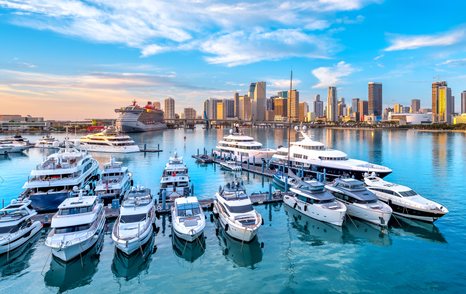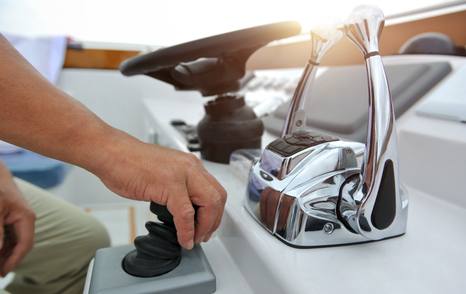There’s no better feeling than finding the right yacht for your adventures. It’s easy to picture yourself taking in the sunset from the deck with the cool sea breeze on your face. Yet, another element adds to this tranquility—having the assurance that your vessel is covered at the most favorable price.
YachtBuyer sought the advice of Alison Melia, a Marine Insurance Specialist at Insure4Boats, and asked for her top tips for reducing your yacht insurance premium, so you can focus on enjoying your maiden voyage and yacht ownership.
Marina Benefits
Store your yacht in a marina
Opting to keep your yacht in a marina might lead to lower insurance costs compared to those who don't.
This operates in a similar way to car insurance, which can be less expensive if you keep your vehicle in a locked garage overnight as opposed to parking it on a public road.
A marina equipped with 24-hour security and secure fixed berths enhances the security of your vessel, potentially resulting in reduced premiums and excess.


You can even take this one step further and keep your boat ashore each time it’s not in use. This
reduces your premium further since the insurer usually assumes that aside from the lay-up period,
your boat is always in the water.
Market Value
Insure your yacht for the correct market value
The market value of your yacht significantly influences the cost of your yacht insurance.
It’s important to regularly check the current market value of your yacht to ensure it’s insured for the correct amount. You wouldn't want to pay premiums based on its brand-new value. Additionally, if you've added items or undertaken enhancements that increase its value, it's important to update the insured amount to avoid being underinsured.

To determine recent sold prices for your boat's make and model, explore the YachtBuyer website.
Arranging a valuation with a marine surveyor is the best way to get an accurate valuation and ensure you’re not under or over-insured. This is typically included as part of your pre-purchase survey.
Perfect Match
Opt for a yacht that matches your experience
If you’re going to be handling the yacht yourself, buying a yacht that matches your personal level of experience is one of the best ways to keep risk down from the outset, especially if you're a new boat owner.
The maximum speed and the size of your yacht are two factors that affect the cost and conditions of your insurance policy, along with your marine experience, which is something to keep in mind.

Owners of high-performance yachts who are new to boating should expect a higher premium due to limited experience with this specific boat type.
Cruising Ground
Be realistic with your cruising area
Once you've found and purchased your dream yacht, it's unnecessary to pay for a cruising range you will never use. For instance, if you plan to stay within the UK, opting for a range that includes Europe or the Mediterranean may increase costs without providing any real benefit.
Keep in mind that straying from your agreed navigational limits can be considered a policy breach, potentially compromising your coverage in the event of a claim. So, if you do decide to increase your cruising area, speak to your insurer first.
Be Aware
Be cautious of pre-bundled insurance packages
Many yacht insurance providers offer pre-bundled packages, potentially leading to paying for unnecessary add-ons.
To avoid this, opt for a company like Insure4Boats, which allows you to customize your own online quote, so your policy is tailored to your exact requirements. That way, you only ever pay for the cover you need.
It’s important to remember you must not withhold information from your insurance provider about what you’re doing with your yacht. Withholding information about your yacht activities could compromise the policy in the event of a claim. Make sure the information you provide is accurate and up to date.

Be Transparent
Be transparent with information on previous claims
As with any boating activity, accidents can happen when you’re cruising on your yacht—this is why many owners choose to cover their vessel through insurance.
If you've recently made a claim, it's important to be transparent with your insurer, providing detailed information about the incident and associated costs. The more the underwriter knows about a previous claim, the better.
Conversely, if you've had no claims, ensure you inform your insurer, as they may offer a no-claims bonus. The longer you've been sailing without claims, the potential for a lower premium increases.
Summary
- Berth your yacht in a marina
- Insure your yacht for the correct market value
- Opt for a yacht that matches your experience
- Be realistic with your cruising area
- Be cautious of pre-bundled insurance packages
- Be transparent with information on previous claims
Thanks to Alison Melia and the team at Insure4Boats for their advice and contribution to this article.



